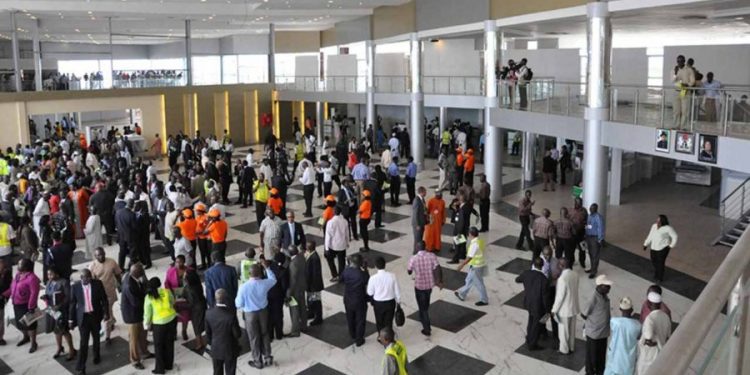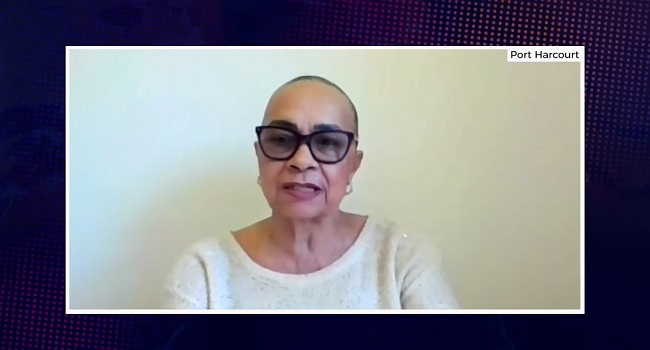Aviation
Nigerian Airlines Lament as Fuel Scarcity Causes Flight Disruptions

By Derrick Bangura
Nigerian airlines have attributed flight delays and disruptions to their inability to source aviation fuel, known as Jet A1 on demand.
In letters addressed to their passengers, some of the airlines explained that following the cancellation of the plan to shut down flight operations on May 9, 2022, there had been marked delays in the supply of aviation fuel to the airports by oil marketers.
Since February this year when oil marketers increased aviation fuel price from N190 per litre to N400 per litre and in March when the airlines contested the second increase of prices, flight operations have suffered hiccups.
Major airline operator, Dana Air was the first to complain of flight disruptions due to late supply of products and last weekend, THISDAY learnt that Air Peace flight from Asaba was delayed due to late supply of the product.
Similarly on Thursday, Azman Air sent a message to its passengers apologising for the protracted delays and even cancellations of some of its flights, blaming it on the scarcity of aviation fuel The airline said though there had been promising prospects to address the problem, it became important to advice the general public that until there was resolution, disruption of flights might be unavoidable.
“Our obligation at Azman Air to deliver hassle free services to our esteemed customers is recently being hindered by incessant challenges facing the Nigerian aviation sector due to jet A1 price hike and scarcity.
“The paucity of this product has labelled our services with protracted delays and even cancellations thereby subjecting our customers to unintended hardships in getting to their destinations.
“Though there has been promising prospects to overturn this obstacle, it is important to advice the general public that until there is resolution, disruption of flights may be unavoidable. We totally understand the effect these disruptions poses on our passengers and we can only appeal and crave your understanding while we continue to navigate the situation,” Azman said.
The Deputy Chief Executive Officer (CEO) of Dana, Sukhjinder Mann, in a message to its passengers recently, also revealed that the airlines were again witnessing the scarcity of aviation fuel across the airports in Nigeria which has caused flight delays and cancellations but that they have thXXX commitment of their fuel partners to meet their requirements.
“Unfortunately, we are again witnessing the scarcity of Jet A1 fuel across the airports in Nigeria, which has in some cases, caused recent flight delays. Our commitment towards offering a convenient and reliable schedule has never been in doubt and has always been centered on setting new standards in customer experience and redefining air travel and this communication is to reassure you that we have the commitment of our fuel partners to service our requirements,” Mann said.
Spokesman of Air Peace, Stanley Olisa said the airline was also finding it difficult to get fuel as the scarcity persisted and was causing flight disruptions.
The spokesperson of Air Air, Ola Banji, also confirmed that aviation fuel was not readily available, so airlines had to wait for it, which causes delays.
But the Managing Director of Cleanserve, Chris Ndulue, said there was global petroleum product supply disruption due to the Russua-Ukraine crisis, noting that the scarcity was not peculiar to Nigeria, saying countries such as the UK were also experiencing same.
He denied claims by the AON that fuel was now being sold for N700, insisting that the price was between N540 and 580. He said the intervention of the Nigerian National Petroleum Corporation (NNPC) in the importation of aviation fuel was unnecessary and advised that the Central Bank of Nigeria should make forex available to marketers.
Aviation
NAF airstrikes destroy terrorist food depot, kill scores in Lake Chad

This is contained in a statement by the Director, Public Relations and Information, Nigerian Air Force (NAF), Air Commodore Olusola Akinboyewa, on Monday in Abuja.
Akinboyewa said the NAF aircraft carried out the operations in Nov. 23 on the strategic location, identified through meticulous intelligence efforts.
He said the location served as a critical food storage site and a sanctuary for terrorist commanders and fighters.
He added that intelligence had previously linked terrorists in the location to recent attacks, including the assault on troops in Kareto on Nov. 16.
According to him, the NAF fighter jets, in response, launched a robust air interdiction mission, destroying identified structures used as storage facilities and neutralising terrorists on-site.
“Mop-up operations using cannons ensured the complete elimination of fleeing hostile elements.
“The operation’s success was made possible by extensive Intelligence, Surveillance, and Reconnaissance (ISR) missions conducted over several days, confirming the presence of active terrorist structures camouflaged under dense vegetation.
“The destruction of the terrorist enclave, including food storage facilities, severely disrupted their logistical operations, while the neutralisation of a significant number of fighters diminished their capacity to launch future attacks,” he said.
Akinboyewa said the mission had demonstrated the NAF’s unwavering commitment to defending our nation and people, acting singly and supporting surface forces in counterterrorism operations.
He reiterated the NAF’s commitment to sustain robust independent and joint operations until all enemies of Nigeria’s prosperity and wellbeing are brought to justice.
Africa
Customs hands over illicit drugs worth N117.59m to NDLEA

The Nigeria Customs Service (NCS), Ogun Area 1 Command, has handed over illicit drugs worth N117.59 million to the National Drug Law Enforcement Agency (NDLEA).
The Comptroller of the command, Mr James Ojo, disclosed this during the handing over of the drugs to Mr Olusegun Adeyeye, the Commander of NDLEA, Idiroko Special Area Command, in Abeokuta, Ogun, on Friday.
Ojo said the customs handed over the seized cannabis and tramadol tablets to the Idiroko Special Command for further investigation in line with the standard operating procedures and inter-agency collaboration.
He said the illicit drugs were seized in various strategic locations between January and November 21, 2024, in Ogun State.
He added that the illicit drugs were abandoned at various locations, including the Abeokuta axis, the Agbawo/Igankoto area of Yewa North Local Government Area, and Imeko Afton axis.
Ojo said that the seizure of the cannabis sativa and tramaling tablets, another brand of tramadol, was made possible through credible intelligence and strategic operations of the customs personnel.
“The successful interception of these dangerous substances would not have been possible without the robust collaboration and support from our intelligence units, local informants and sister agencies.
“These landmark operations are testament to the unwavering dedication of the NCS to safeguard the health and well-being of our citizens and uphold the rule of law,” he said.
He said the seizures comprised 403 sacks and 6,504 parcels, weighing 7,217.7 kg and 362 packs of tramaling tablets of 225mg each, with a total Duty Paid Value of N117,587,405,00.
He described the height of illicit drugs smuggling in the recent time as worrisome.
This, he said, underscores the severity of drug trafficking within the borders.
“Between Oct. 13 and Nov. 12 alone, operatives intercepted a total of 1,373 parcels of cannabis sativa, weighing 1,337kg and 362 packs of tramaling tablets of 225mg each,” he said.
Ojo said the seizures had disrupted the supply chain of illicit drugs, thereby mitigating the risks those substances posed to the youth, families and communities.
He lauded the synergy between its command, security agencies and other stakeholders that led to the remarkable achievements.
Ojo also commended the Comptroller General of NCS for creating an enabling environment for the command to achieve the success.
Responding, Adeyeye, applauded the customs for achieving the feat.
Adeyeye pledged to continue to collaborate with the customs to fight against illicit trade and drug trafficking in the state.
Africa
Ann-Kio Briggs Faults Tinubu for Scrapping Niger Delta Ministry

Prominent Niger Delta human rights activist and environmentalist, Ann-Kio Briggs, has criticised President Bola Tinubu’s decision to scrap the Ministry of Niger Delta, describing it as ill-advised and detrimental to the oil-rich region.
Briggs expressed her concerns during an appearance on Inside Sources with Laolu Akande, a socio-political programme aired on Channels Television.
“The Ministry of Niger Delta was created by the late (President Umaru) Yar’Adua. There was a reason for the creation. So, just removing it because the president was advised. I want to believe that he was advised because if he did it by himself, that would be terribly wrong,” she stated.
President Tinubu, in October, dissolved the Ministry of Niger Delta and replaced it with the Ministry of Regional Development, which is tasked with overseeing all regional development commissions, including the Niger Delta Development Commission (NDDC), North-West Development Commission, and North-East Development Commission.
Briggs questioned the rationale behind the restructuring, expressing concerns about its feasibility and implications. “But that’s not going to be the solution because who is going to fund the commissions? Is it the regions because it is called the Regional Development Ministry? Is it the states in the regions? What are the regions because we don’t work with regions right now; we are working with geopolitical zones,” she remarked.
She added, “Are we going back to regionalism? If we are, we have to discuss it. The president can’t decide on his own to restructure Nigeria. If we are restructuring Nigeria, the president alone can’t restructure Nigeria, he has to take my opinion and your opinion into consideration.”
Briggs also decried the longstanding neglect of the Niger Delta despite its significant contributions to Nigeria’s economy since 1958. “The Niger Delta has been developing Nigeria since 1958. We want to use our resources to develop our region; let regions use their resources to develop themselves,” she asserted.
Reflecting on the various bodies established to address the region’s development, Briggs lamented their failure to deliver meaningful progress. She highlighted the Niger Delta Basin Authority, the Oil Mineral Producing Areas Development Commission (OMPADEC), and the NDDC as examples of ineffective interventions.
“NDDC was created by Olusegun Obasanjo…There was OMPADEC before NDDC. OMPADEC was an agency. Before OMPADEC, there was the Basin Authority…These authorities were created to help us. Were we helped by those authorities? No, we were not,” she said.
Briggs further described the NDDC as an “ATM for failed politicians, disgruntled politicians, and politicians that have had their electoral wins taken away from them and given to somebody else.”
Her remarks underscore the deep-seated frustrations in the Niger Delta, where residents continue to advocate for greater control over their resources and improved governance.
-

 Headlines4 years ago
Headlines4 years agoFacebook, Instagram Temporarily Allow Posts on Ukraine War Calling for Violence Against Invading Russians or Putin’s Death
-

 Headlines4 years ago
Headlines4 years agoNigeria, Other West African Countries Facing Worst Food Crisis in 10 Years, Aid Groups Say
-

 Foreign4 years ago
Foreign4 years agoNew York Consulate installs machines for 10-year passport
-

 News1 year ago
News1 year agoZero Trust Architecture in a Remote World: Securing the New Normal
-

 Entertainment3 years ago
Entertainment3 years agoPhyna emerges winner of Big Brother Naija Season 7
-

 Headlines2 years ago
Headlines2 years agoNigeria Customs modernisation project to check extortion of traders
-

 Entertainment2 years ago
Entertainment2 years agoMovie download platform, Netnaija, announces closure
-

 Economy2 years ago
Economy2 years agoWe generated N30.2 bn revenue in three months – Kano NCS Comptroller













